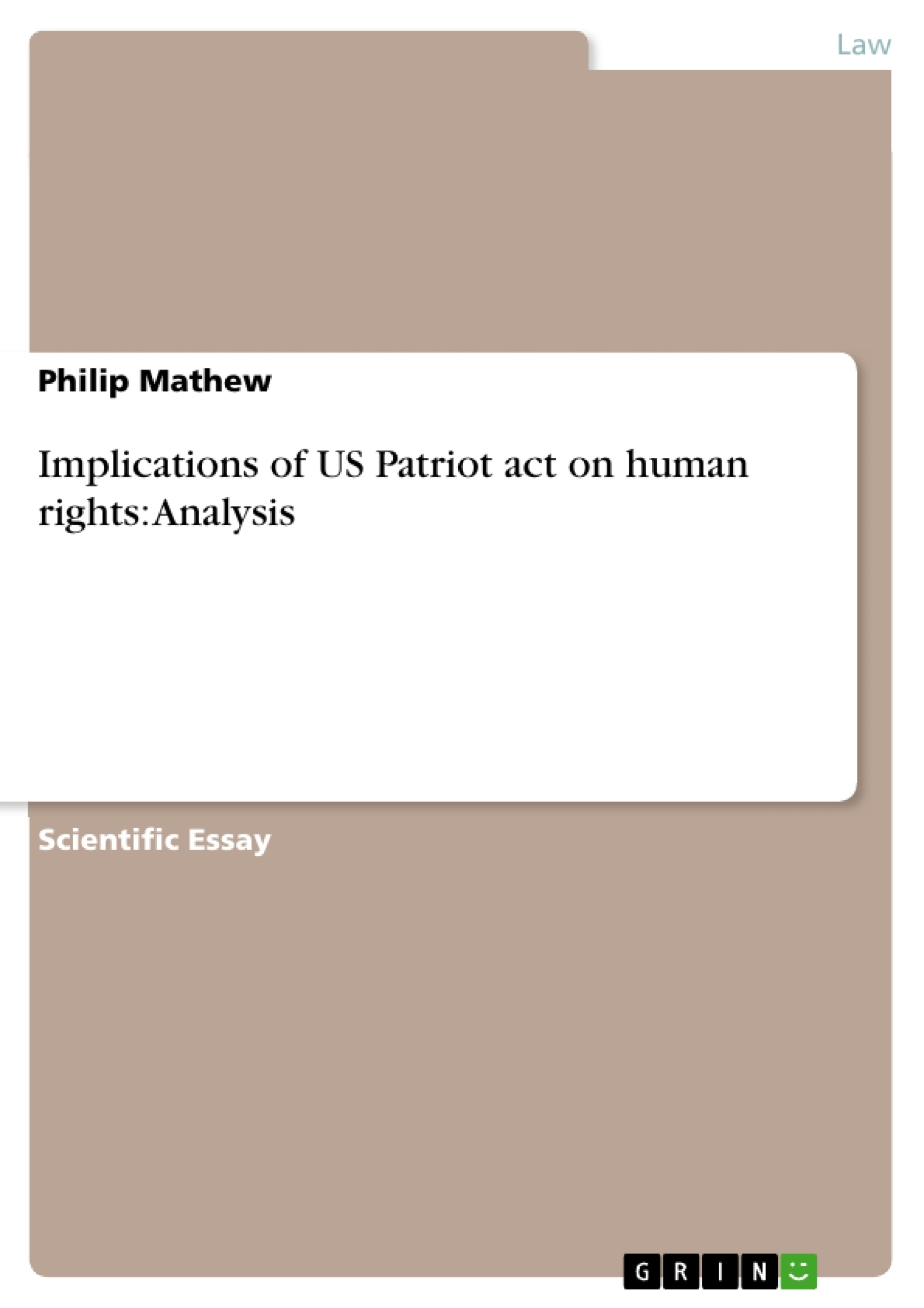Against the backdrop of the horrendous happenings of 11th September,2001 the American Congress, cloaked in fear capitulated to the Bush administration’s demand for a new anti-terror law by overlooking the tumultuous objections from the civil liberties organization from both ends of the political spectrum. The Congress approved the Uniting and Strengthening America by Providing Appropriate Tools Required to Intercept and Obstruct Terrorism Act, which is better known by its acronym the U.S.A PATRIOT ACT with an overwhelming majority of 356 votes to 66 in the House and 98 votes to one in the U.S Senate1. In the process the Congress brushed aside a more promising anti-terrorism bill that the House Judiciary Committee had unanimously approved, that would have addressed a number of civil liberties concerns. The complex and far reaching legislation was drafted hastily and without being subjected to much debates and discussion or conferences or committee reports that any other significant act would undergo was signed and made a law by the president of the United States, George W. Bush on 26th October 2001.
This essay deals with the implications of U.S.A. patriot act on human rights.
Inhaltsverzeichnis (Table of Contents)
- CHAPTER 1: THE BACKGROUND
- 1.1 Alien and sedition laws.
- 1.2 Chinese exclusion act
Zielsetzung und Themenschwerpunkte (Objectives and Key Themes)
This research examines the implications of the USA PATRIOT Act on human rights. It explores the historical context of similar legislation in the US, highlighting instances where civil liberties were compromised in the name of national security. The research delves into the Act's provisions and analyzes their impact on fundamental rights, particularly those related to privacy, due process, and freedom from arbitrary detention.
- The historical context of civil liberties restrictions in the US
- The provisions of the USA PATRIOT Act and their impact on human rights
- The potential for abuse of power and the erosion of democratic values
- The implications of the Act for immigrants and US citizens
- The use of the Act for political gain and the erosion of due process
Zusammenfassung der Kapitel (Chapter Summaries)
Chapter 1: The Background provides a historical context for the USA PATRIOT Act by examining previous instances of civil liberties restrictions in the US. This chapter explores the Alien and Sedition Acts of 1798 and the Chinese Exclusion Act of 1882, highlighting how these laws were used to suppress dissent and target specific groups. The chapter explores the political climate surrounding these acts and the consequences of their enactment.
Schlüsselwörter (Keywords)
The key terms and concepts central to this research include the USA PATRIOT Act, human rights, civil liberties, national security, privacy, due process, freedom from arbitrary detention, immigrants, and the abuse of power. The research focuses on the historical context of civil liberties restrictions in the US and the implications of the PATRIOT Act for fundamental rights and democratic values.
Frequently Asked Questions
What is the USA PATRIOT Act?
It is an anti-terrorism law passed by the US Congress in October 2001 following the September 11 attacks.
How does the PATRIOT Act impact human rights?
The act is analyzed for its potential to compromise civil liberties, particularly regarding privacy, due process, and arbitrary detention.
What historical context is provided in the analysis?
The research looks back at previous restrictive laws like the Alien and Sedition Acts (1798) and the Chinese Exclusion Act (1882).
Why was the enactment of the PATRIOT Act controversial?
Critiques focus on the fact that it was drafted hastily without extensive debate, brushing aside other bills that addressed civil liberties concerns.
Who signed the USA PATRIOT Act into law?
It was signed by President George W. Bush on October 26, 2001.
- Quote paper
- Philip Mathew (Author), 2007, Implications of US Patriot act on human rights: Analysis, Munich, GRIN Verlag, https://www.grin.com/document/112556



